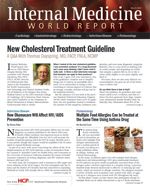Publication
Article
Internal Medicine World Report
Expanded Cancer Guidelines Now Include Lynch Syndrome Screening
Author(s):
At the beginning of Colon Cancer Awareness month, the National Comprehensive Cancer Network expanded its guidelines to include Lynch syndrome screening, which should dramatically increase the number of patients eligible for hereditary colon cancer testing.

At the beginning of Colon Cancer Awareness month, the National Comprehensive Cancer Network expanded its guidelines to include Lynch syndrome screening, which should dramatically increase the number of patients eligible for hereditary colon cancer testing.
Lynch syndrome is the most common cause of hereditary colon cancer in adults, but prior guidelines and a lack of reimbursement historically limited screening among at-risk asymptomatic patients.
"We view the expansion of guidelines to broaden access to Lynch syndrome screening as a major victory for patients and their families," Patrick Lynch JD, MD, professor in the Department of Gastroenterology at the University of Texas MD Anderson Cancer Center, said in a statement. “It is the culmination of a significant amount of work by patient advocates and healthcare professionals to bring about this important advancement in guidelines.”
The new guidelines recommend that patients with a 5% or greater risk threshold for Lynch syndrome are appropriate for testing, while recommending against sequential testing for the 5 Lynch syndrome genes in lieu of panel testing.
The expanded guidelines also acknowledge that patients with cancer can proceed directly to sequencing tests without a complicated tissue screening algorithm.
"Our hope is that these guidelines are broadly accepted by the medical community, which would dramatically expand the number of at-risk, asymptomatic, patients who have access to the life-saving information associated with Lynch syndrome testing," Lynch said.
Under the new guidelines, approximately 30% of newly diagnosed colorectal cancer patients, 100% of newly diagnosed endometrial cancer patients, and 3% of asymptomatic patients will now quality for Lynch syndrome testing, according to estimates from Myriad Genetics.
"Our experience is that restrictive and confusing hereditary colon cancer guidelines have limited patient access compared to those in hereditary breast and ovarian cancer," Mark Capone, president of Myriad Genetic Laboratories, said in a statement. “This is a major step to expand access to genetic testing for all patients at risk for hereditary colon cancer.”






